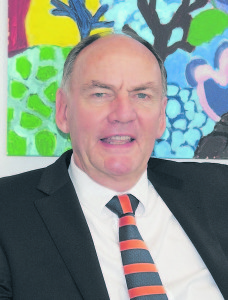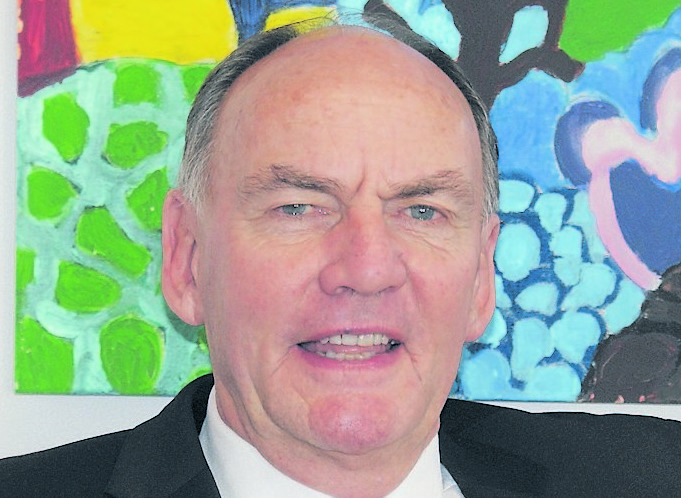by PETER GRACE
A teacher, manager and leader who worked for 25 years in the state school sector retires at the end of the year after 25 years in Catholic education.
Neil Laurenson is the manager of Catholic Education Services in Auckland, a position he has held for a quarter of a century.

Neil Laurenson
Mr Laurenson told NZ Catholic that he grew up in Piopio, in the King Country. Like his early teaching, his schooling was in the state sector. He attended Piopio Primary School, and was then a boarder at New Plymouth Boys High School.
He trained at Auckland Teachers’ College from 1964 to 1965, then taught over seven years at three different New Zealand schools — at Tuakau, Taumarunui and Pakuranga Heights.
Then he went to Canada for about two and a half years. “I taught for six months at Moosonee, on the edge of St James Bay.” Mr Laurenson arrived in early winter, with the river iced over, and experienced truly low temperatures.
An air force base had been put in there during the war, he said, and a railway line was put through. “Now it’s a tourist attraction and it’s called the Polar Bear Express.”
After Moosonee, Mr Laurenson taught for two years in Toronto, then returned to New Zealand. Some time later, he met Lyn, a woman he’d first met in Taumarunui. “Lyn went overseas, as I did,” he said, “and we reconnected about six years later in Auckland when we were introduced by a mutual friend, not realising that we already knew each other. “We married in 1977.”
Mr Laurenson said his overseas experience obviously showed him a different system of education. For example, he said, when he was in Canada, principals would find staff not by advertising, as in New Zealand, but by tapping into a pool of teachers.
“And all the children went home for lunch. You had an hour and a half for lunch, and the children went home.” Back in New Zealand, he became deputy principal at three different Auckland schools, Beachlands, Otahuhu Primary and Clover Park Intermediate, before being appointed principal at Western Heights School in Henderson.
“And then I joined the inspectorate and was in there for about two and a half years before Tomorrow’s Schools came in, and the inspectorate moved into ERO.”
Two years or so in the inspectorate/ERO, from 1989 to 1991, ended his state sector involvement. His job for Auckland diocese then was much the same as it is now, Mr Laurenson said.
But there have also been noticeable changes in Catholic education. “When I first came in the job there were quite a few religious in the schools, and they were the ones expected to carry the charism [of the schools they were in].” However, the number of religious became fewer and fewer and schools had taken on the responsibility of putting their own flavour on their charisms.
Special character, he said, makes Catholic schools different from state schools, but it also makes Catholic schools different from each other.
Another significant change is rapid growth in Catholic schools. “That’s been due to the fact that the schools are well performing and have got a reputation and a good name, and people wanting, in fact, to get [their children] in.” A third change, Mr Laurenson said, has been the increasing ethnic diversity of students.
“So I think that’s another strength of our schools. They are very multicultural and very accepting of each other’s cultures.”
The growth as a whole was a highlight of his time. Mangere Catholic Primary School had just had a review. Fifteen years ago, that school was only a dream in someone’s mind, so it was very satisfying going back now and seeing how well it was doing.
The biggest change of all was that teachers no longer stand in front of the classroom and impart all the knowledge. “Children are now guided to actually find that information for themselves, so it’s more of a guided learning. “But apart from that, and I think as a result of that, students have a much greater respect for the teachers than they may have had in days gone by.”
Students were more motivated to learn, and the schools also had more equipment than they had years ago. Mr Laurenson said the most satisfying achievement for him over the past quarter of a century was being able to build a team of people who have worked well together for the students in the diocese’s schools.
“While you are in here, it could be quite easy to lose sight of why you are being paid to do the job. So as a team, we are quite aware of what we are doing in a school Mass or a school production and you think, ‘Yes, that’s why we are doing our job’.”
For some staff, such as support staff in the office without a teaching background, it was not quite as easy. “So actually being able to visit schools, this helps makes them see the impact of what it is they are doing.”
After 50 years in education, Mr Laurenson is in no hurry to commit to any particular activity after the end of this year. “I’m just going to let it happen,” he said.

Reader Interactions